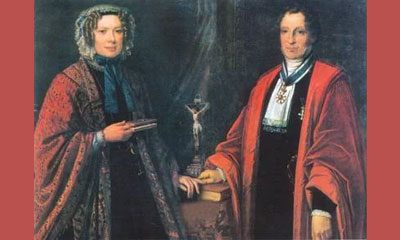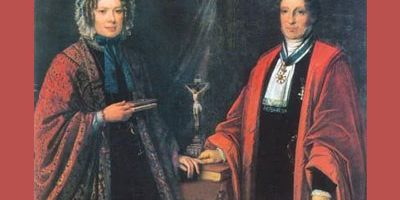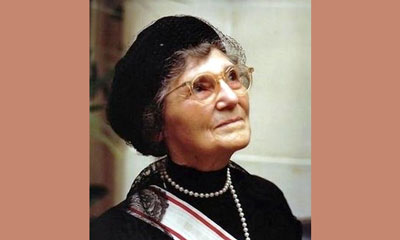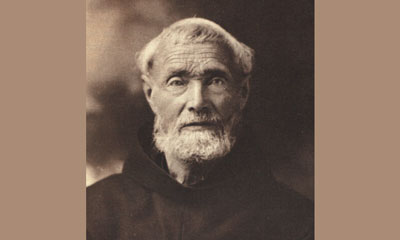November 25, 2016
Venerable Juliette and Tancredi Barolo
Dear Friends,
Turin, 1814. During the Easter Octave, the Marquise Juliette di Barolo encountered a procession bringing the Blessed Sacrament to a sick person. She knelt. All of a sudden, in the middle of the sacred hymns, a piercing voice screamed, “It is soup I need, not viaticum!” This provocation from a prisoner in the nearby prison led the young woman to enter it. She was scandalized by the degradation to which the prisoners were reduced. She was especially shocked upon visiting the women’s section: “They threw themselves upon me,” she said, “shouting all at once, and their state of degradation caused me pain, a shame that I can recall only with vivid emotion… I returned home my heart broken with sorrow, not knowing how to better the prisoners’ physical and moral state.” The Barolo couple saw in this discovery a sign from Providence—for the rest of their lives, they would devote themselves to works of mercy.
 Juliette was born and baptized on June 26, 1786, in Maulevrier Castle (near Cholet, in France). Her father, Edouard Colbert, was the French ambassador to the Archbishop Elect of Cologne. He was descended from the younger brother of Louis XIV’s famous Minister of Finance, Jean-Baptiste Colbert. His wife, Anne Marie de Quengo, gave birth to four children. The French Revolution disrupted the life of the family, which had been living in Bonn, Germany. In 1793, a grueling fugitive life began for the Colberts, taking them to Holland, then Belgium. Juliette was further traumatized by her mother’s death in Brussels in October 1793, then by the death of her paternal grandmother, guillotined in 1794. When Napoleon finally authorized the return of émigrés to France, the Colbert family found the family castle burned down, their land laid waste, and the inhabitants reduced to poverty. This difficult trial did not deter the marquis from his primary duty—passing on the Christian faith and culture to his children. In 1804, with the proclamation of the Empire, Juliette joined the imperial court as a lady-in-waiting in the Empress’ Household. It was under these circumstances that she made the acquaintance of the young Marquis di Barolo.
Juliette was born and baptized on June 26, 1786, in Maulevrier Castle (near Cholet, in France). Her father, Edouard Colbert, was the French ambassador to the Archbishop Elect of Cologne. He was descended from the younger brother of Louis XIV’s famous Minister of Finance, Jean-Baptiste Colbert. His wife, Anne Marie de Quengo, gave birth to four children. The French Revolution disrupted the life of the family, which had been living in Bonn, Germany. In 1793, a grueling fugitive life began for the Colberts, taking them to Holland, then Belgium. Juliette was further traumatized by her mother’s death in Brussels in October 1793, then by the death of her paternal grandmother, guillotined in 1794. When Napoleon finally authorized the return of émigrés to France, the Colbert family found the family castle burned down, their land laid waste, and the inhabitants reduced to poverty. This difficult trial did not deter the marquis from his primary duty—passing on the Christian faith and culture to his children. In 1804, with the proclamation of the Empire, Juliette joined the imperial court as a lady-in-waiting in the Empress’ Household. It was under these circumstances that she made the acquaintance of the young Marquis di Barolo.
The last descendent of the noble Piedmontese Falletti family of Barolo, Carlo Tancredi was born in Turin on October 26, 1782. From his youth, Tancredi was noted for his intelligence, his zeal for justice, and the nobility of his sentiments. He was pious, open, and attentive to the demands of his times. When Napoleon called back the emigrated French aristocracy—as well as that from other regions he controlled—to lend more luster to his court, Tancredi was forced to move to Paris. He entered the Page Corps, then became chamberlain of the Emperor’s Household.
Tancredi and Juliette discovered that they had in common a deep faith, a broad culture, and a desire to commit themselves to improving society. Yet their temperaments were vastly different—she was impetuous, endowed with a brilliant mind and quick to retort, while he was gentle, reserved, and thoughtful. The wedding was celebrated in Paris on August 18, 1806. The two families’ considerable fortune allowed the young couple to live a carefree life until Napoleon’s fall in 1814. Having moved to Turin, they made frequent visits to Paris. During their travels, they visited new social institutions inspired by the Gospel. Their life was, however, sadly marked by infertility. In spite of this trial, their mutual love grew in purity and strength, for it rested on the virtues of faith and charity. Adhering to the divine will, they accepted that they would not have children, and adopted in their place the poor of Turin; in doing so they would realize great spiritual fertility.
“Some couples are unable to have children. We know that this can be a cause of real suffering for them. At the same time, we know that marriage was not instituted solely for the procreation of children. Even in cases where, despite the intense desire of the spouses, there are no children, marriage still retains its character of being a whole manner and communion of life, and preserves its value and indissolubility. So too, motherhood is not a solely biological reality, but is expressed in diverse ways. Adoption is a very generous way to become parents. I encourage those who cannot have children to expand their marital love to embrace those who lack a proper family situation. They will never regret having been generous. Adopting a child is an act of love, offering the gift of a family to someone who has none. It is important to insist that legislation help facilitate the adoption process, above all in the case of unwanted children, in order to prevent their abortion or abandonment. Those who accept the challenge of adopting and accepting someone unconditionally and gratuitously become channels of God’s love. For He says, Even if your mother forgets you, I will not forget you (Is. 49:15)” (Pope Francis, March 19, 2016).
The “Children’s Garden”
The Barolos welcomed into their majestic mansion in Turin children whose parents had abandoned them out of necessity or negligence. This was the origin of what was called the “Children’s Garden.” The schedule consisted of catechism lessons, reading, prayers, games, etc. The goal was to infuse in these malleable minds the essentials of the moral life, such as the fear of God, respect for one’s parents, obedience, and honesty. The teachers, initially zealous lay women, were replaced by nuns in 1832. Two years later, the couple founded what would become the Congregation of the Sisters of St. Anne of Providence, to provide a Christian education to these children.
For her part, Juliette, who had discovered all the horror of the prison system, managed to visit the prisons, in spite of her family’s opposition. The prisoners received her with insults and sometimes blows. Without becoming discouraged, the marquise continued her visits. Eventually they accepted her and spoke to her calmly. She spent her days with these women, catechizing them and teaching them to read, to pray, to forgive, and to grow in holiness. Making the most of their connections, the Barolos sent the authorities reports on the prisoners’ degrading living conditions, proposing several solutions. Juliette wanted to meet with the authorities, yet these visits were much more difficult for her than the company of the prisoners. At first greeted coldly and with an ironic politeness, she eventually convinced them, and soon gained real authority. Thus, in 1821, the Barolos got a prison exclusively for women opened. Juliette, who was named its superintendent, had a chapel built within it, and took care of all of its expenses. The prisoners, who had improved through her guidance and the affection she showed them, expressed their joy at not being deprived of religious celebrations. “My poor children,” she told them on this occasion, “God is always with us, but it is a great happiness to be able to take part in the Holy Sacrifice that His love has instituted for the remission of our sins.” To support her in this work, the marquise contributed to the establishment of the Sisters of Saint Joseph of Savoy in Turin. Under their gentle and charitable influence, the prisoners increased in their fidelity and obedience. Juliette testified, “Many women died in prison, all with a saintly calm and unshakable confidence in the Divine Mercy. I did not see a single one die in unbelief, and if irreligion at first showed itself, it gradually yielded to exhortations and good examples. I encountered a great deal of ignorance, not lack of belief; more than once I heard this exclamation: ‘Thanks to you, Madame, I am happy that I was put into prison. I have learned to know good from evil, and to find consolation in religion.’”
The “Magdalenes”
In 1823, the Piedmontese government granted the Barolos the right to found, at their own expense, a home for former female prisoners and reformed prostitutes. Entrusted to the Sisters of Saint Joseph, under Juliette’s initiative this home would give rise to two communities: a convent of contemplative nuns, the “Magdalenes,” for reformed prostitutes who felt called to devote themselves to God, and a third order dedicated to caring for the sick in hospitals, the Oblates of Saint Mary Magdalene, for those who were not called to contemplative life but nevertheless did not wish to return into the world.
In 1816, Tancredi was elected to the city council of Turin. He became a municipal official, then one of the two mayors in 1826 and 1827. During his twenty-two years of service as a municipal administrator, he became, among other things, the promoter and supporter of educational and charitable initiatives, with the goal not only of aiding the poor but of promoting justice and social stability. A member of the commission for public instruction, he took charge of the organization of primary education, entrusting it to the Christian Brothers, and having upper elementary grades introduced, which until then had not existed. These schools were for working class youth who sought to complete their education before beginning working life. Their goal was twofold: first, to reduce the growing number of students who were filling the secondary schools but had no hope of gaining admittance to university studies; and second, to provide sufficient education and preparation for those destined for artisanal or commercial professions. A wise educator, Tancredi involved himself with the rules, books, exams, and teaching methods for the various disciplines.
While renovating or building churches, hospitals, and schools, and working to improve the living conditions of his fellow citizens, the marquis still found time to write formative works, particularly for youth. These simply written pamphlets were given away free. Tancredi never missed an opportunity to stir elevated and edifying thoughts in the reader. In “Brief Instructions for Youth,” he called on youth “to turn with fervent prayers and a sincere heart to their heavenly Father so that He might guide them with love and unerringly on the short road on which they place their feet. Then, they are to beg Him to grant them either the ability to choose, or the grace to accept a situation that is above all in accord with His will.”
Having become an ordinary municipal official again, and motivated by a religious respect for the souls of the deceased, Tancredi offered a considerable sum for the establishment of a new cemetery in Turin. In return, he asked only for a modest plot be set aside for his family, and an inscription inviting others to pray for the repose of his soul and those of his family.
A deep friendship
Juliette, who gave most of her time to works of mercy, dedicated more than an hour a day to prayer and wore a hair shirt (a belt of horsehair worn as an instrument of penance). Very cultured, fluent in five languages, she charmed the intellectual and political elite of Turin she welcomed into her home. The Barolos also opened their home to the poet Silvio Pellico (1789-1854) on his release from prison. This fiery patriot was working for Italian unity. Considered by the Austrians to be a dangerous revolutionary, he was sentenced to death, soon commuted to harsh imprisonment. The Barolos became his benefactors and hired him as a librarian in 1834. Tancredi developed a deep friendship with him. He confided to the poet “that he had felt in Juliette a continual drive to perfect herself in virtue,” and that he considered her to be “the most natural creature, incapable of pride or dishonesty;” “if he had passionately loved her at their first meeting, he continued to love her more and more.” In 1838, Silvio Pellico became Juliette’s secretary, accompanying her on her visits to the poor and to houses of charity.
In 1835, a cholera epidemic struck the Piedmont, then Turin. Unlike other members of the aristocracy who hastened to flee the city, the Barolos, who were then in the countryside, immediately returned. Tancredi organized help for the sick; he established emergency aid centers and infirmaries that were open day and night. Tormented by the fear that Juliette would be infected, he allowed her only to give aid and comfort to the widows and orphans, but not to come near the contagious patients. Later on, his fear receding, he allowed his wife to care for the sick. During these tragic weeks, when many in Turin displayed great courage and generosity, the municipal officials made to Our Lady Consolata, patroness of the city, a solemn vow to obtain from Divine Mercy the end of the epidemic. Tancredi prepared the text of the vow. The city council promised to restore the crypt chapel of Saint Andrew’s Church (now the crypt of the Consolata), and to erect at the church a column topped by a statue of the Blessed Virgin, to institute the Forty Hours’ Devotion, and, each August 30 for seven consecutive years, to participate in a Mass of thanksgiving to Mary Consolatrix. The parchment with the vow was handed to the archbishop by the city council during a solemn Mass. The vow, along with prayers, secured the end of the epidemic, which diminished to a few isolated cases and soon completely disappeared. In return for their zeal, Juliette received the city’s gold medal, and Tancredi was made a “Commander of the Order of Saints Maurice and Lazarus.”
Who will leave first?
However, the health of the Barolos began to decline, Juliette’s rather seriously as reflected in her appearance, while that of her husband less visibly. One day Tancredi declared to his wife: “I have confidence that Providence will arrange for me to leave first.” The cholera epidemic had been over three years when pains began to assail him. On the advice of doctors, the couple set out for Tyrol for some rest. At the beginning of the journey, Tancredi’s health declined seriously, and they decided to return home. In Chiari, close to Brescia, he was at the point of death. The local priest gave him Extreme Unction (Anointing of the Sick). In Juliette’s arms, he peacefully entered into the true Light on September 4, 1838.
The marquis’ remains were taken to Turin. The authorities, friends, and a large crowd of the poor who wished to show their gratitude rushed to pay their respects to the deceased. The funeral was celebrated in the Church of San Dalmazio, in great simplicity as he had specified in his will. Only prayer for the repose of his soul was important to him. He had made arrangements for a number of Masses to be celebrated for this intention, and for alms to be distributed to the poor and to charities. On his tombstone, Juliette had this epitaph engraved: “He did much good for many; he would have liked to do so for all.”
When the marquis died, the “Doves”—as the Sisters of St. Anne were called, which he had founded four years earlier for the education of abandoned children—were still sheltered in a little warm nest while waiting to take flight. Juliette finished defining the charism of the young institute, and drew up its constitutions, which the archbishop of Turin approved in 1841. At the end of 1845, she spent six months in Rome to obtain the approval of the Holy See, which was granted on March 8, 1846. From that point on, the congregation spread throughout Italy, then, in 1871, into mission lands. Juliette would always be very attached to the “Doves”—she visited their establishments and concerned herself with their economic resources, as well as with the spiritual vitality of the communities.
For the education of girls from high society, the marquise called the Ladies of the Sacred Heart to Turin. This order was founded in France by Saint Sophie Barat (1779-1865), with whom she was friends. She also supported the efforts of Saint Giuseppe Benedetto Cottolengo (1786-1842), the founder, in the same city, of the Little House of Divine Providence. In 1832, Tancredi, at the time administrator of the hospital in Moncalieri, had wanted an annex built for poor children. Faithful to her husband’s wishes, Juliette oversaw this project and had it moved to Turin. The dedication took place in 1845. Orphan girls from poor families were hospitalized there. Juliette asked Don Bosco (1815-1888), a young priest, to be its chaplain, as well as to provide spiritual direction to the girls from the Refuge, founded in 1823. The collaboration between the chaplain and the marquise lasted only two years. In his apostolate Don Bosco gave priority to the street boys, whom he brought to the facilities associated with the marquise’s charitable endeavors. This close proximity with the girls was not without its problems. Moreover, Don Bosco did not budget his energies, and fell ill. Since he refused to stop taking care of his boys, Juliette had to let him go. Nevertheless, she continued to provide anonymous financial support for his efforts through an intermediary.
A path to Heaven
In 1848, Europe was once again shaken by revolution. In Turin, street demonstrations sought to bring about a unified Italian state, without regard for the age old rights of the Holy See over the Papal States. The demonstrations took aim at the Catholic Church and her institutions. The Marquise di Barolo was serious threatened, and was advised to leave the city. “I cannot take my five hundred adopted daughters with me,” she replied sharply. “So I must stay with them as a mother until the end. So perhaps they want to cut off my head? Well, that is also a path to Heaven. The Lord gave my grandmother the courage to die at the guillotine, He will certainly not abandon me. Neither threats, nor persecutions, nor torture will force me to desert the post to which my duty holds me!” This trial only increased her patience and resolution. But her calm, even after public order was restored, did not erase all fears for the future.
Anxious to preserve everything she had accomplished with her husband, Juliette gathered all of their works together within an institution called “Opera Pia Barolo,” recognized by civil decree. Towards the end of her life, in 1863, the marquise financed much of the construction of a church dedicated to Saint Julia, her patron saint, in Borgo Vanchiglia, the working-class area of Turin. In October, having fallen ill once again and sensing death was near, she prepared herself with a great spirit of faith to appear before God. She awaited the moment with her heart full of hope, her eyes fixed on the crucifix and in her hand a picture of the Virgin that the holy Curé of Ars had sent her. She died peacefully on January 19, 1864. Today in the choir of Saint Julia’s Church rest the mortal remains of the Barolos. The process for Julia’s beatification was opened in 1991 and that for Tancredi’s in 1995. On May 5, 2015, the heroicity of Julia’s virtues was declared, making her “Venerable,” the first step on the way to beatification.
You received without pay, give without pay (Mt. 10:8), Jesus said. He also declared: You did not choose me, but I chose you … that you should go and bear fruit and that your fruit should abide … This I command you, to love one another (Jn. 15:16-17). Thus, the gifts that the Lord gives us are meant for the good of our neighbor. The Barolos placed in the service of the poor the great riches the Lord had freely given them. Following their example, may we put the talents we have, as negligible as they may be, to good use in the service of our brothers and sisters.









